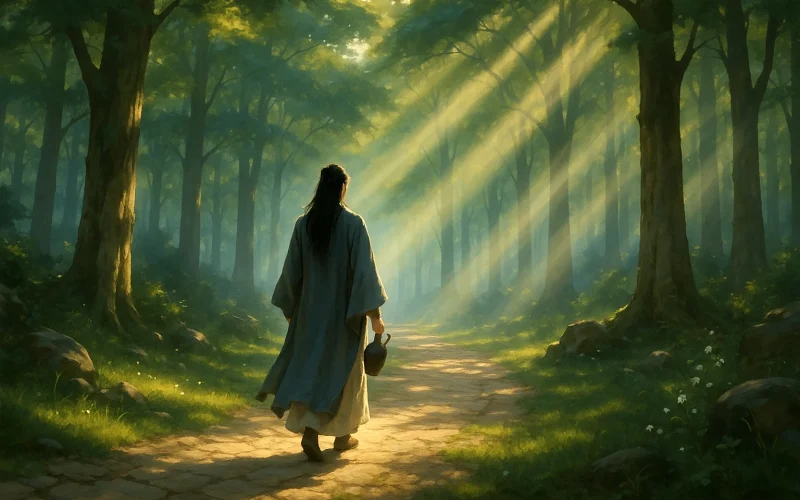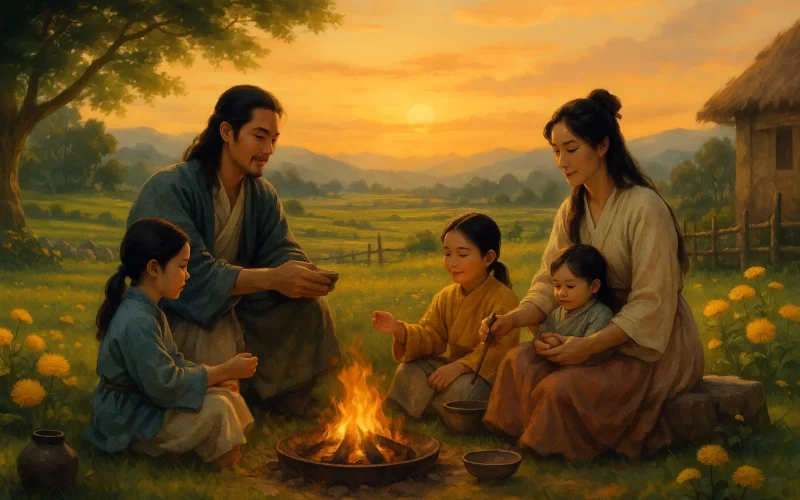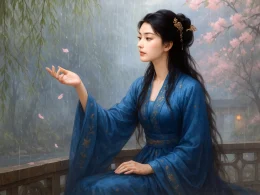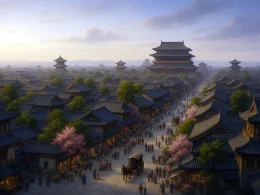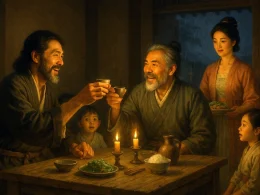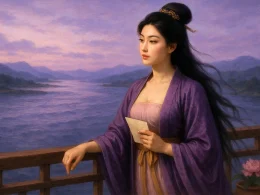Impartial is Heaven’s power high,
All things follow its laws divine.
Man levels up with earth and sky.
Is it not due to power mine?
Different beings as we are.
Still we’re Three united in One.
We live and die under same star,
And know how to end what’s begun.
The three great emperors were sages,
But where can they be found today?
The oldest Peng had lived eight ages,
Bald could not have a longer stay.
Young and old will die in the end;
Wit and fool may have the same fate.
Wine may make you forget, not mend.
Won’t it make death precipitate?
Doing good will gladden your mind.
Who’ll sing after your death your praise?
Do not think of things of such kind,
But follow nature in future days.
Play with rising or ebbing tide
Without pleasure and without fear!
Enjoy sunny as shady side!
Let things appear and disappear!
Original Poem
「形影神 · 其三 神释」
陶渊明
大钧无私力,万理自森著。
人为三才中,岂不以我故。
与君虽异物,生而相依附。
结托既喜同,安得不相语。
三皇大圣人,今复在何处?
彭祖爱永年,欲留不得住。
老少同一死,贤愚无复数。
日醉或能忘,将非促龄具?
立善常所欣,谁当为汝誉?
甚念伤吾生,正宜委运去。
纵浪大化中,不喜亦不惧。
应尽便须尽,无复独多虑。
Interpretation
This poem was composed in 413 CE when Tao Yuanming was 49 years old. By then, the poet had resigned from official duties and returned to rural life for many years, entering a phase of mature philosophical contemplation in his later years. The triptych Body, Shadow, and Spirit employs allegory through dialogues among "Body," "Shadow," and "Spirit" to explore life, mortality, and values, presenting a new philosophical vision that blends Daoist naturalism with individual spiritual freedom. As the third installment, "Spirit" responds to the previous debates of "Body" and "Shadow," synthesizing life perspectives and demonstrating the poet's transcendent,顺应自然 (shùnyìng zìrán, conforming to nature) worldview.
First Couplet: "大钧无私力,万理自森著。"
Dà jūn wú sī lì, wàn lǐ zì sēn zhù.
The great Potter's Wheel is impartially powerful; all principles manifest themselves distinctly.
The opening establishes the cosmic "Jun" (nature) as unbiased, allowing all things to follow their inherent order, reflecting the poet's profound understanding of "natural ontology."
Second Couplet: "人为三才中,岂不以我故?与君虽异物,生而相依附。"
Rén wéi sān cái zhōng, qǐ bù yǐ wǒ gù? Yǔ jūn suī yì wù, shēng ér xiāng yīfù.
Though humans rank among the Three Powers (heaven-earth-humanity), is it not because of me (Spirit)? Though we differ, we've been interdependent since birth.
Here "Spirit" declares itself as the core of life and soul's foundation, emphasizing spirituality's fundamental role in human existence.
Third Couplet: "结托既喜同,安得不相语?"
Jié tuō jì xǐ tóng, ān dé bù xiāng yǔ?
Since we coexist joyfully, how can we not converse?
The dialogic format creates an internal philosophical arena, enhancing speculative vitality and authenticity.
Fourth Couplet: "三皇大圣人,今复在何处?"
Sān huáng dà shèngrén, jīn fù zài hé chù?
Where now are the Three Sovereigns, those great sages of antiquity?
This rhetorical question negates the permanence of fame-based immortality, rejecting Confucian "renown doctrine" as a path to eternity.
Fifth Couplet: "彭祖爱永年,欲留不得住。"
Péng zǔ ài yǒng nián, yù liú bù dé zhù.
Though Peng Zu coveted longevity, he couldn't remain forever.
Using Peng Zu (legendary long-lived sage) as an example, it refutes "Body's" pursuit of physical immortality, underscoring death's inevitability.
Sixth Couplet: "老少同一死,贤愚无复数。"
Lǎo shào tóng yī sǐ, xián yú wú fù shù.
Young or old, wise or foolish—all meet the same death without exception.
Reinforces life's equality and ultimate unity, again dismissing distinctions based on fame or lifespan.
Seventh Couplet: "日醉或能忘,将非促龄具?"
Rì zuì huò néng wàng, jiāng fēi cù líng jù?
Daily drunkenness may bring oblivion, but isn't it also life-shortening?
Counters "Body's" "drunken escapism," noting its self-destructive futility.
Eighth Couplet: "立善常所欣,谁当为汝誉?"
Lì shàn cháng suǒ xīn, shéi dāng wèi rǔ yù?
Though virtue brings joy, who will forever praise you?
Refutes "Shadow's" "virtuous legacy" argument, noting even noble deeds face oblivion.
Ninth Couplet: "甚念伤吾生,正宜委运去。"
Shèn niàn shāng wú shēng, zhèng yí wěi yùn qù.
Overthinking harms life; we should entrust ourselves to fate.
Proposes the core philosophy: "委运 (wěi yùn, yielding to destiny)"—following nature and accepting one's essence.
Tenth Couplet: "纵浪大化中,不喜亦不惧。应尽便须尽,无复独多虑!"
Zòng làng dà huà zhōng, bù xǐ yì bù jù. Yīng jìn biàn xū jìn, wú fù dú duō lǜ!
Surge freely within nature's transformations, neither clinging to joy nor fearing loss. When time ends, let it end—no more futile worries!
The climactic conclusion advocates complete harmony with the cosmic process, epitomizing the poet's transcendent outlook and pushing his "New Naturalism" to its zenith.
Holistic Appreciation
As "Spirit's" definitive response, this poem systematically refutes both physical immortality ("Body") and moral legacy ("Shadow"), advancing through rhetorical questions and profound dialectics. Its plain language carries deep resonance, grounded in the principle that "humans are but one phenomenon between heaven and earth." Rejecting both transcendence and Confucian fame, Tao champions "yielding to nature's flow," crystallizing the serene, authentic philosophy forged through his political disillusionment.
Artistic Merits
The poem retains the allegorical triad dialogue but lets "Spirit" synthesize and transcend prior arguments, establishing Tao's "New Naturalism." Its austere yet tranquil diction conveys ultimate truths about existence and cosmic law. Structurally, it sequentially dismantles hedonism and moralism before culminating in the liberating vision of "surging freely within nature's transformations." The tonal shift—from debate to lament, then to serene resolve—marries emotional rhythm with philosophical architecture, rendering abstract themes vividly poetic. This represents the pinnacle of artistic-philosophical fusion.
Insights
The poem offers a radical lens on mortality: rather than chasing illusions of permanence through longevity or reputation, one should embrace nature's rhythms with clear-eyed grace. Tao's solution—"when time ends, let it end"—is neither resignation nor nihilism, but a tender, clear-minded honoring of life's ephemeral freedom. For modern readers drowning in achievement anxiety or digital immortality fantasies, this 1,600-year-old wisdom remains a compass: true liberation lies in releasing attachments and flowing with the great transformation.
Poem translator
Xu Yuanchong (许渊冲)
About the poet

Tao Yuanming(陶渊明), 365 – 427 CE, was a poet, literary figure, fu writer, and essayist active during the late Eastern Jin and early Liu Song dynasties. Born in Chaisang (near present-day Jiujiang, Jiangxi Province), he pioneered a new genre of pastoral-themed literature, expressing profound philosophical insights through simple language. His poetic style became an enduring aesthetic standard in classical Chinese poetry.







